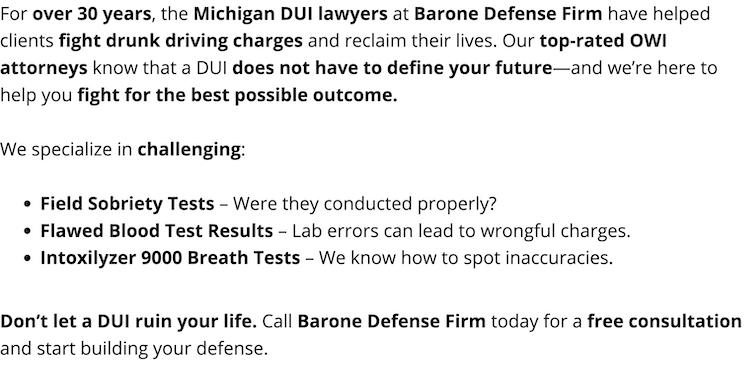Law Enforcement Does Not Show Up to DUI Case: What It Means for Your Defense
Common Misconceptions About Police Absence in DUI Cases
A widespread misconception among Michigan drivers is that if the arresting officer fails to appear in court, their DUI case will automatically be dismissed. While it is true that the officer’s absence can weaken the prosecution's case, dismissal is not guaranteed. Judges base their decisions on various factors, including the circumstances of the officer’s absence and the defendant’s rights. Understanding how these factors play into your case can help you and your attorney craft a strong defense.
When Is the Officer’s Testimony Required?
The arresting officer is often the prosecution’s primary witness in DUI cases. Their testimony is typically required at key stages, such as:
- Pre-Trial Motions: If the officer’s testimony is needed to justify the legality of the traffic stop, arrest, or field sobriety tests.
- Trial: If your case proceeds to trial, the officer’s testimony is crucial for establishing the prosecution’s narrative and providing evidence of alleged impairment.
However, the officer’s presence is not required at every court appearance. For example:
- Arraignment: This is your initial court appearance where you are formally charged. No testimony is required, so the officer’s absence at this stage does not result in dismissal.
Factors Judges Consider When the Officer Fails to Appear
Judicial Preferences: Pro-Police vs. Pro-Process
Judges vary in their attitudes toward police absence:
- Pro-Police Judges: These judges may grant multiple continuances to accommodate the officer’s schedule or excuse their absence due to reasonable circumstances.
- Pro-Process Judges: These judges prioritize the defendant’s right to a speedy trial and are less inclined to delay proceedings if the officer fails to appear without good cause.
Reasons for the Officer’s Absence
The reason for the officer’s failure to appear can also influence the judge’s decision:
- Legitimate Reasons: Injury, illness, or other unavoidable circumstances may lead the judge to allow a continuance.
- No Valid Excuse: If the officer misses court without a reasonable explanation, the judge may be more likely to dismiss the case, especially if the absence affects the prosecution's ability to present evidence.
Why the Officer’s Absence Matters
The arresting officer’s testimony is often pivotal in establishing the state’s case. Their absence can create significant challenges for the prosecution, such as:
- Weakening the Evidence: Without the officer’s testimony, key details of the traffic stop, field sobriety tests, or arrest may be excluded.
- Violating Your Rights: If the officer’s absence causes unnecessary delays, your attorney can argue that your right to a speedy trial has been compromised.
How an Experienced OWI Defense Attorney Can Help
If the arresting officer fails to appear, a skilled DUI attorney from the Barone Defense Firm can take advantage of this opportunity by:
- Arguing for Dismissal: Highlighting how the officer’s absence undermines the state’s case.
- Filing Motions to Suppress Evidence: If the officer cannot testify to validate certain evidence, your attorney can argue for its exclusion.
- Pursuing Case Reduction: Negotiating for lesser charges or penalties if the prosecution’s case is weakened.
Having an experienced attorney on your side ensures that you have a strong advocate who understands the legal nuances of your case and can protect your rights.
Why Choose Barone Defense Firm?
The Barone Defense Firm has a proven track record of successfully defending DUI cases across Michigan. We offer:
- Comprehensive Legal Strategies: Tailored to the unique circumstances of your case.
- Aggressive Defense: Challenging police errors, procedural violations, and evidence inconsistencies.
- Statewide Representation: Serving clients in Bloomfield Hills, Grand Rapids, Ann Arbor, Troy, and beyond.
Take Action to Protect Your Future
If you’re facing DUI charges and the arresting officer failed to appear in court, you may have a stronger defense than you realize.
Contact the Barone Defense Firm today for a free consultation. Call 248-306-9158 or contact us online to discuss your case with an experienced DUI attorney.
 Barone Defense Firm Home
Barone Defense Firm Home
















